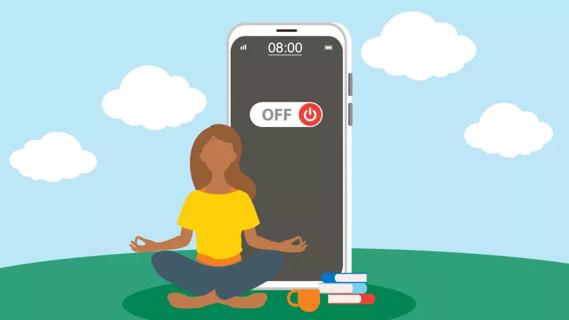How to help them trade screen time for green time

It’s not unusual to see a 3-year-old expertly operate an iPad or smartphone. Many kids seem more comfortable indoors in front of a screen rather than outside at a park or playground.
Advertisement
Cleveland Clinic is a non-profit academic medical center. Advertising on our site helps support our mission. We do not endorse non-Cleveland Clinic products or services. Policy
How can you foster a love of the outdoors in kids despite the lure of technology?
Here, pediatrician Gregory Weaver, MD, MPH, explains how to encourage kids of all ages to take breaks from their electronics and play outside — without nagging or forcing things:
Two- to 3-year-olds are fearless explorers and probably the easiest group to get outside. They yearn to touch, smell (and eat) their environment.
By ages 3 and 4, kids are “little scientists,” running experiments to help understand the world around them, Dr. Weaver says.
“When parents ask me what the best toy is for their 2-year-old, I say, ‘You.’ If you interact with your child and show a personal interest in the natural world, your child will reflect your interest,” he says.
It’s best not to present going outside as a chore or as a way to get exercise. Let kids see it as an exciting opportunity to discover new sights, smells and sounds in a beautiful, exciting place.
“When we take walks with our young daughters, my wife and I point out new birds or animals, or talk about the colors of the flowers we see along the way,” says Dr. Weaver.
As kids move into the early school years, they’re likely less curious about getting outdoors just for the sake of exploring the world.
Advertisement
Here, the best tactic is to find things they like to do outside, and work from there. For instance, most kids love swimming, so that’s almost always a hit. Sports often serve as a good catalyst for breaking away from screens, too.
Look for exercise that both you and your kids enjoy. (If it feels like a chore, you’ll all find ways to avoid it.)
“Find things kids are excited about. Then build a natural experience around them, so it doesn’t feel as if they’re being forced to eat their vegetables,” says Dr. Weaver.
If kids are slightly older and really object to playing outside — or if you live in an area with little green space — look for a zoo, aquarium, botanical garden or other kind of natural space to visit.
Even many art museums — which often have free admission days — have outdoor areas or atriums for children to explore, he says.
Electronic devices and video games are engineered to capture — and hold — your attention. And no one is more susceptible than teenagers.
So during the teen years, you may have to mandate outdoor time.
Dr. Weaver recommends creating a structure but allowing your teens to make choices within it.
For example, give them a plan for the week, but let them choose their “no screens allowed” times or days. Then offer a few outdoor options for those times.
“Sometimes you have to say, ‘enough is enough,’ and deal with the griping. But the alternative must be fun,” he says. “And you have to allow kids to act independently within the structure you set up.”
Even when kids are skeptical at first, they’ll likely come around if they have a hand in planning their outdoor time.
An important note about teens: Be sure you’re living by the same rules you give them. If you ask them to put their screens away, then turn yours off, too. “It’s not fair to expect something out of a teen that you aren’t willing to do yourself,” says Dr. Weaver.
The bottom line? Your whole family will benefit from less screen time and more green time.
Advertisement

Sign up for our Health Essentials emails for expert guidance on nutrition, fitness, sleep, skin care and more.
Learn more about our editorial process.
Advertisement

It isn’t a recognized mental health disorder, but research shows that problematic social media use can negatively affect your mental health, self-esteem and sleep

Too much blue light, especially from digital sources, may lead to eye strain and computer vision syndrome

When done in excess, watching TV can disrupt your sleep and lead to physical inactivity and social isolation

Imagination, completing tasks and social interactions are all key benefits for your brain

They’re fun to watch, but medical TV shows are often more hype than reality — and you shouldn’t rely on them for factual medical information

Embrace mindfulness and practice checking your phone consciously, not compulsively

Identify your triggers, set ground rules for your break and start practicing mindfulness

Too much screen time and unrealistic expectations and perceptions and can lead to an increased risk of anxiety and depression

Even small moments of time outdoors can help reduce stress, boost mood and restore a sense of calm

A correct prescription helps your eyes see clearly — but as natural changes occur, you may need stronger or different eyeglasses

Both are medical emergencies, but they are very distinct events with different causes